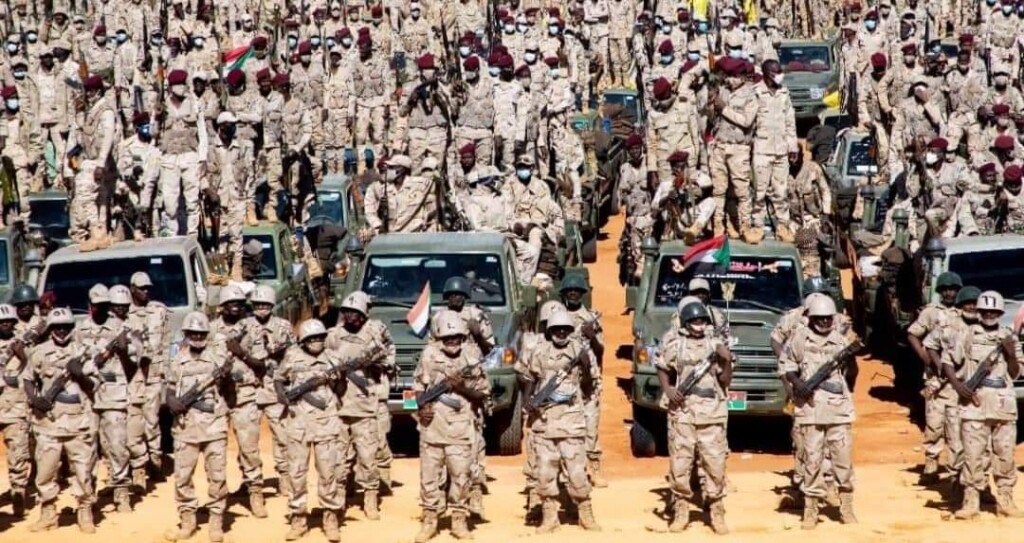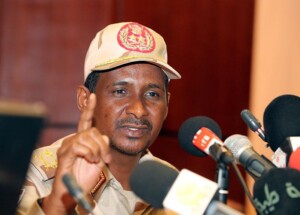Sudan RSF advisor: ‘We’ll hand over areas under our control to the people, not the army’

RSF forces near Merowe in northern Sudan, April 13, two days before the war with the Sudan Armed Forces erupted (File photo: RSF)
According to Yousef Ezzat, political advisor to the commander of the Rapid Support Forces (RSF), the paramilitaries will not leave the areas under their control before starting negotiations with the Sudanese army about a ceasefire. “This also raises the question about who will take over the conquered states after we would have withdrawn,” he told Radio Dabanga in an interview on Monday.
Ezzat belied rumours circulating on social media about the RSF accepting to leave El Gezira and Khartoum on the condition that the Sudan Armed Forces (SAF) does not interfere with their forces.
“The areas now controlled by our forces will not be handed over. We will not that easily give up the great gains achieved by taking control of all army bases in Khartoum and Wad Madani,” the political advisor said.
Wad, Madani, capital of El Gezira came under control of the RSF last week, after only four days of fighting.
“The RSF taking of El Gezira came in response to the speeches of SAF Commander Abdelfattah El Burhan in which he repeatedly said that he would mobilise 40,000 young Sudanese to fight the RSF along with the army. “So, we resolved the matter in front of the whole world, and which led to the withdrawal of the army in the state,” he explained. “Wad Madani would not have been a military target without the recruiting speeches by the army chief.”
Condition
The SAF has repeatedly conditioned the RSF’s withdrawal from urban areas for the start of new negotiations about a ceasefire, something the RSF categorically refuses.
“We will not hand over any territory, whether Khartoum, Wad Madani, Nyala, or any other city controlled by the RSF to the SAF,” Ezzat said and vowed “to hand these areas over to their people and native administration leaders* so they can establish their own authority.
“All military forces will leave the cities following the establishment of one professional national army that is not controlled by one hand,” he stressed, pointing out that these conditions are known. “We almost reached an agreement with the SAF at the Jeddah negotiation platform, but the army delegation withdrew. Now there is no party anymore to negotiate with and to hand over any area.”
Assaults
In response to the repeated assaults committed by their forces on civilians, Ezzat firstly called for condemnation of the war itself and of the violence against the RSF paramilitaries and the Sudanese people.
“In Khartoum, our forces are still witnessing artillery shelling, air strikes, and mass killings,” he lamented. “Furthermore, the RSF include Sudanese from all directions and do not favour a specific ethnicity. We at the RSF Command condemn any lawlessness against civilians, also if it comes from our own forces or those who wear RSF uniforms or fight in the name of the RSF.”
Ezzat went on strongly defending the RSF soldiers. “RSF officers in various parts of Sudan participate in committees of local communities in order to protect the people and deal with complaints about attackers from unknown parties, who often wear RSF uniforms and ride on motorcycles. After we received reports about villagers being assaulted in the south of El Gezira, we immediately sent forces to help them out.”
During the invasion of Wad Madani, RSF units entered from the east of the Nile, took control of the Hantoub bridge, and entered the El Gezira capital. “However, there were other forces riding on motorcycles, which entered from the west of the Nile, and plundered the city. We do not know who leads them and whom they are following.”
The RSF are conducting an investigation into these hitherto unidentified armed men. “Their behaviour is intolerable,” he said.
“We will not compromise on anything regarding the attacks on villagers in El Gezira. The task of persecuting these unruly is entrusted to Commander Abu Agla Keikel. If these men are affiliated with the RSF, they will be tried fairly and publicly, and if they were only wearing RSF uniforms, they will face the same fate.”
The RSF advisor called on the Sudanese to cooperate and immediate report any human rights violations. “From our side, we are doing their best to contain this lawlessness.”
Provision of aid
Ezzat expressed the RSF’s readiness “to allow all organisations and medical staff to fully practice work in their areas of control in Khartoum, Darfur, Kordofan and now in El Gezira”.
“Organisations are allowed to move freely according to the humanitarian protocol of May. We are in contact with the United Nations and its Office for the Coordination of Humanitarian Affairs (OCHA) in Port Sudan that organises the movement of aid convoys,” he said, and added that “international organisations so far have not complained of any harassment in the areas controlled by the RSF”.
Face-to-face meeting
Ezzat confirmed that the RSF received an invitation from the secretariat of the Horn of Africa’s Intergovernmental Authority on Development (IGAD), to hold a meeting between RSF Commander Lt Gen Mohamed ‘Hemedti’ Dagalo and SAF Commander Lt Gen Abdelfattah El Burhan.
The RSF received the invitation, the advisor stated, and delivered a written response agreeing to meet at any time and place. “We received information that the army commander took a similar step.”
The advisor, however, is not optimistic about reaching an agreement with the army leader. “But we are used to such positions, and we remain open to a ceasefire. We have a serious and real desire to stop this war and are ready to negotiate to reach a comprehensive peace. We all know that the SAF is unable to achieve a victory.”
He recalled that they had reached a cessation of hostilities at the Jeddah platform in end July and reached the final drafting stage “but the withdrawal of the army delegation hindered the signing of that agreement”.
‘Cessation of all wars’
Ezzat linked the stopping of the current war to the cessation of all wars in Sudan. “We need to agree to any conditions that serve the Sudanese people and avoid new wars, by addressing the causes of the recurrent battles in the country.”
He affirmed the RSF’s readiness to cooperate with the fact-finding committee the UN Human Rights Council agreed to set up in October with the aim to investigate war crimes and crimes against humanity committed during the war between the Sudanese army and the RSF since April 15.
“We demanded the formation of such an investigation committee but the Sudanese army issued a statement rejecting the proposal. We do welcome a fair and impartial international investigation into crimes against civilians, also when the International Criminal Court is involved, as we have been waiting for justice since 2003 until now. Those indicted by the ICC have not been extradited so far.”
* The Native Administration was instituted by British colonial authorities seeking a pragmatic system of governance that allowed for effective control with limited investment and oversight by the state. The state-appointed tribal leaders also took on responsibilities for executing policies, collecting taxes, and mobilising labour on behalf of the central government. According to the Darfur Bar Association (DBA), the Native Administration during the 30-year rule of dictator Omar Al Bashir did not represent the real community leaders.











 and then
and then